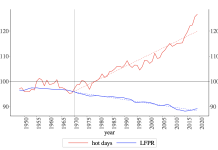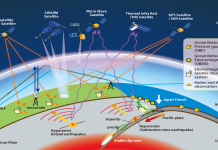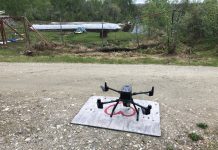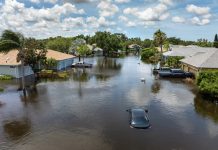Open Access Government produces compelling and informative news, publications, eBooks, and academic research articles for the public and private sector looking at health, diseases & conditions, workplace, research & innovation, digital transformation, government policy, environment, agriculture, energy, transport and more.
Home 2025
Archives
Water pollution in the textile industry: An urgent call for sustainable innovation
For business leaders and scientific professionals, addressing water pollution is crucial for the environment, economy, regulatory compliance, and public reputation. Victor Durand at Ever Dye highlights this issue in the textile industry and urgently calls for sustainable innovation.
Climate and hydrologic change across the Great Lakes region and other transboundary waters
Scott Steinschneider, M. Altaf Arain, Paulin Coulibaly, Andrew Gronewold, and Gail Krantzberg, explore climate and hydrologic change across the Great Lakes region in North America and other transboundary waters.
Carbon-neutral lifestyle changes and their impact on future health in cities
Dr Peter Hoffmann and Deniz Sirin at Climate Service Center Germany explore carbon-neutral lifestyle changes and their impact on future health in cities.
Modeling and mapping forest carrying capacity
Mark Kimsey, Director of the Intermountain Forestry Cooperative, discusses the modeling and mapping of forest carrying capacity, beginning with the historical context.
Permafrost resilience in the era of climate change and Earth system modeling
In this analysis from Everest Group, explore the resilience of permafrost in the context of climate change and earth system modeling, with an emphasis on how science and technology are enhancing Arctic stability and global risk management.
Climate change and the rise of adult male dropouts
Masahiro Yoshida from Waseda University’s Department of Political Science and Economics explores the link between global warming and male labor force participation.
CO2 mineralization in cement and concrete
Hegoi Manzano from the University of the Basque Country (UPV/EHU) explores CO2 mineralization in cement and concrete, along with related EU policies and programmes, as well as carbon capture, utilisation, and storage.
Horticulture: Hormonal therapy for grapevines
Jim Willwerth, Assistant Professor and Researcher at Brock University, Canada, in this horticulture discussion, delves into what we need to know about hormonal therapy for grapevines, including plant growth regulators.
How can carbon capture surfaces help the planet?
Beth McDaniel, JD, President of Reactive Surfaces highlights the potential of Carbon Capture Surfaces (CCS), an innovative and affordable of method using algae for CO2 removal, addressing the urgent need for scalable solutions to combat climate change.
10th Anniversary of the 2015 M7.8 Nepal earthquake: Explore new prediction technologies
Dr. Dimitar Ouzounov from the Institute for Earth, Computing, Human, and Observing (Institute for ECHO) at Chapman University and Dr. Angelo De Santis from the National Institute of Geophysics and Volcanology (Rome, Italy) are exploring new technologies for short-term earthquake forecasting and prediction, including the application of the LAIC approach to the 2015 Gorkha earthquakes in Nepal.
Does moving away from the climate disaster signal a departure from the hydrogen economy?
According to Adélio Mendes, a Full Professor at the Faculty of Engineering of the University of Porto (FEUP), moving away from the climate disaster does indeed signal a departure from the hydrogen economy, presenting a third pathway to consider.
The tenth anniversary of the Paris Agreement: COP30, failure, and renewal
The Conference of the Parties in Belém, Brazil, this November (COP30) will celebrate the tenth anniversary of the Paris Agreement (COP21 in 2015), but where, Richard Beardsworth asks, do things stand ten years on?
Catalyzing mineral weathering for permanent, safe and cost-effective carbon storage
Martin Van Den Berghe, CEO of Cytochrome, discusses catalyzing mineral weathering for permanent, safe, and cost-effective carbon storage.
Measuring permafrost thaw subsidence in agricultural fields in Alaska
Melissa Ward Jones, a Research Assistant Professor at the Water and Environmental Research Center (WERC) of the University of Alaska Fairbanks, discusses research focused on understanding the interactions of permafrost thaw and agriculture.
How climate extremes are endangering millions in Africa
Alain Tamoffo, Postdoctoral Researcher at the Climate Service Center Germany (GERICS), Helmholtz-Zentrum Hereon, discusses how climate extremes are endangering millions in Africa.
No safe haven: Why business leaders must act now to address Earth’s polycrisis
As hurricanes devastate former climate havens, learn why business leaders must embrace Sustainable Strategic Management to address Earth’s polycrisis before it’s too late.
Biochar technology to sequester billions of tons of CO2
This CDR champion industry, biochar, has proven technology that can quickly grow to sequester billions of tons of CO2. However, the industry has growing pains it must overcome to reach its extraordinary potential, James Gaspard, CEO of Biochar Now LLC, reveals.
Decarbonising the textile industry: A revolutionary pigment from the lab to the market in...
Explore the journey of decarbonising the textile industry through the remarkable example of bringing a revolutionary pigment from the lab to the market in three years, starting with the milestones of this captivating journey.
Climate change, water change and the critical role of community resilience
Dr. Amanda Shankland, Dr. Carolyn Johns, and Gail Krantzberg, explore climate change resilience, water change, and the critical role of climate-ready communities.
A novel approach to sampling microplastics
Applied Ocean Sciences is creating a sensor that is faster, more efficient, and less expensive than current sampling methods and will be the first sensor to allow near real-time abundance measurements for microplastics in a water sample.





















